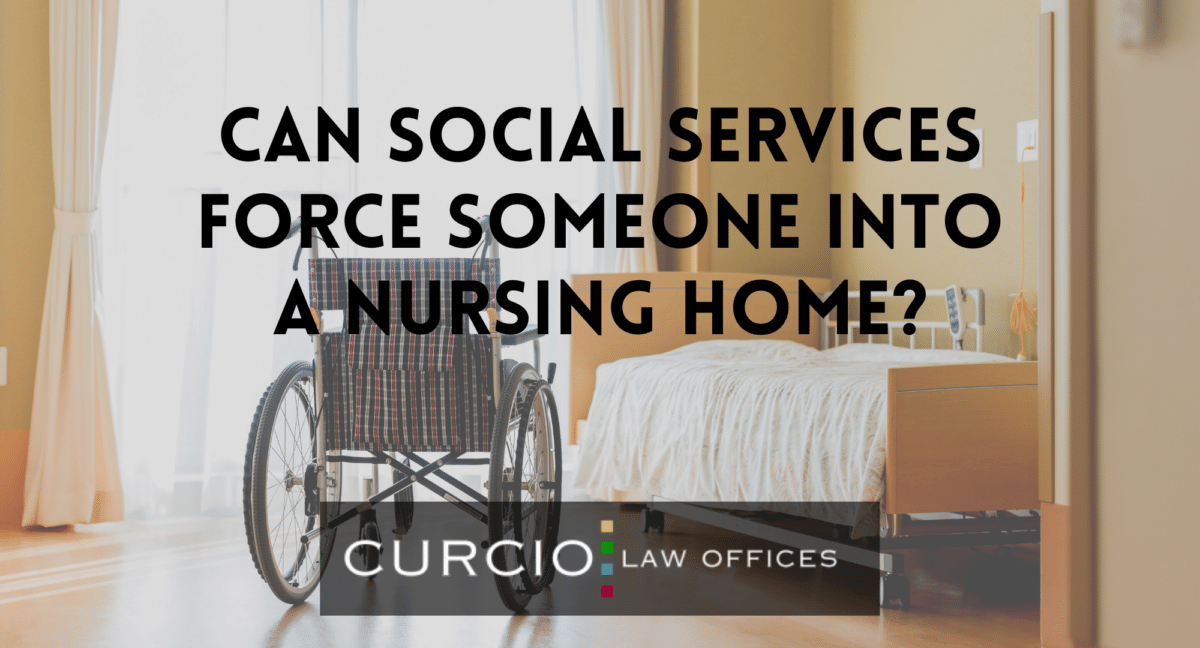No one wants their elderly relative to live the rest of their lives in assisted living facilities. However, for some elderly people, this is the only option, especially as they develop a physical or mental impairment. Maybe your elderly parent refuses assisted living while also struggling to care for themselves in their own home, and maybe you’re wondering: can social services force someone into a nursing home? Chicago nursing home lawyers at Curcio & Casciato recognize and understand difficult situations like this, and we want to protect everyone’s rights. For a free consultation, call 312-321-1111 today.
Can Social Services Make Someone Go To A Nursing Home?
In short, no one can force an elderly vulnerable adult into an assisted living facility unless friends or families have proven that:
- They can’t safely take care of themselves.
- They require round-the-clock care.
- Home health care isn’t an option.
- Family members can’t house and take care of them.
- They are suffering from cognitive impairment, such as dementia.
This means that social workers cannot intervene unless they clearly see that an elderly person is suffering outside of skilled nursing care. They are at risk of falling, developing bedsores, becoming malnourished, or can’t continue to care for themselves in general. The goal of a social worker is to help elderly people by keeping them safe and healthy. Sometimes, nursing homes are the best solution for vulnerable adults, even if it’s not preferable.
What is a Power of Attorney (POA)?
Basically, a power of attorney is a document that appoints someone to make financial or medical decisions on behalf of someone else, especially if they’re suffering from self neglect, suspected abuse, or an inability to make their own decisions. This document also provides specific instructions about what someone wants for medical care or financial management. Generally, the person appointed is called the agent. Many people of older age will appoint a trusted friend or family member as their agent so that they can receive the care that they desire, especially when they’re too physically or mentally ill to do so.
Uniform POA Act
The National Conference of Commissioners on Uniform State Laws (ULC) proposed this U.S. law in 2006 with the goal of creating consistent POA provisions throughout the country. 29 U.S. states have legislated the Uniform POA Act as of 2021.
The provisions of this act include:
- A POA document is valid and long-lasting as soon as someone signs it.
- The responsibilities of a POA agent end once the senior citizen dies.
- The POA document must specifically state compensation rules for agents and other beneficiary changes.
- Third parties can’t be held liable for an agent’s decisions made under the guise of a valid POA agreement.
What An Agent Can Do
An agent can decide:
- Whether they should admit or release their loved one from a nursing home or a hospital
- Which medications or treatments their loved ones should or shouldn’t receive
- Who can access their loved one’s medical records
It’s important to remember that an agent can only make decisions like this if their loved one can’t make these decisions by themselves for whatever reason. The agent is also required to honor the wishes of their loved one while deciding on major medical care. Another important thing to remember is that the agent can only make medical decisions based on the senior citizen’s financial means. So if the senior can’t afford to live in an assisted living facility, they can’t just send them there.
What if I Don’t Have a Power of Attorney?
If you don’t have a power of attorney, the people listed below (in order of priority) can make financial or medical decisions for you if you’re unable to:
- Conservator or guardian
- Partner or spouse
- A child that’s over the age of 18
- A sibling that’s over the age of 18
- Close friend
- Nearest living relative
Power of Attorney for Health Care vs. Living Will
In short, a living will is a document that provides instructions on end-of-life care. More specifically, this document states whether or not you want health care withheld or withdrawn if you’re suffering from a terminal illness.
How Can You Legally Force Someone Into a Nursing Home?
How do you put someone in a nursing home against their will?
Maybe you’re a worried friend or family member reading this, and you’re Googling “memory care near me” or “care home near me,” and you’re wondering how you can legally put your loved one into a home. Basically, the only way you can legally do this is by obtaining guardianship of your loved one.
What is Guardianship?
Guardianship, also called conservatorship, means a person is court-ordered to provide appropriate care for someone else’s health and property. Guardianships are most common for:
- Senior citizens who can’t take proper care of themselves
- Minors
- Mentally or developmentally disabled adults
- Adults found to be medically incompetent
Obtaining Guardianship of a Senior Citizen
Oftentimes, a senior citizen’s loved one or Adult Protective Services (APS) will start the lengthy guardianship process. Judges, APS staff, neuropsychiatrists, psychologists, and elder law attorneys will generally be involved in the process. The person pursuing the guardianship will have to pay for the senior citizen’s legal counsel, all physical or mental evaluations by the doctors, and various other court fees.
If all doctors and APS staff members determine that the senior citizen can no longer make sound decisions or provide their own care, then the person pursuing the guardianship will likely win. If the guardian wins, the court will likely provide limits over their authority for the sake of providing as much autonomy to the senior citizen as possible. For example, the court may allow the guardian to decide where the senior citizen lives, what kind of physical care they receive, and how their money is managed. If a guardian acts outside of the court-ordered authority, they may have to spend more time in court.
How Do I Know If I Need to Go to a Nursing Facility?
If you’re a senior citizen, you may worry that either social services or family members will violate your rights and wishes as you get older by forcing you into an old folks home. Of course, many families don’t do this with evil intentions. Generally, loved ones decide about nursing homes with your well-being and best interests in mind. Your family may determine that a senior living community is your best option for the reasons listed below.
You Need Round-the-Clock Care
As you get older, you may struggle to care for yourself like you always have. This means that you’ll need friends, family, or even a primary care physician to meet your daily needs. Providing constant care can feel impossible for many loved ones of seniors because they often have jobs, kids, and other responsibilities. Unfortunately, most families feel that they can’t provide appropriate care for their senior loved one, and therefore the best alternative is a long-term care facility.
You Don’t Have the Mental Capacity to Make Sound Decisions
Some seniors develop severe mental and neurological issues in their old age, such as dementia or Alzheimer’s. If this is the case for you, your doctor and loved ones will likely have to make health decisions for you, especially if you’re incapable of understanding reality and making safe decisions. This is because it’s dangerous for dementia and Alzheimer’s patients to remain living in their own homes without constant support.
You Require Respite Care
Respite care is often required for seniors who are recovering from a major procedure or a lengthy hospital stay. For example, maybe you’re recovering from a back injury, and your doctor says you’re well enough to leave the hospital but not to go home alone. That’s when friends or family may suggest a respite care home while you finish healing.
You Can’t Afford Home Health Care
Many loved ones prefer home health care for their senior parents or loved ones. Unfortunately, hiring a full-time nurse in your home is often more expensive than long-term care facilities, even with health insurance. However, the exact rates depend on the state, the assisted living center, and home care providers. Monetary situations like this often leave social services with no choice but to take seniors to a facility to receive care.
Can Family Members Be Held Liable for Allowing an Elderly Parent to Live Alone?
In Illinois, family members are generally not held legally liable for allowing an elderly parent to live alone. The decision for an elderly individual to live independently is often respected as a matter of personal choice and autonomy.
However, there could be exceptions if a family member is a designated legal guardian or has assumed a specific legal duty of care, and their negligence directly leads to harm. For example, if a guardian fails to provide necessary care or knowingly allows the elderly person to live in unsafe conditions, they might be held responsible.
It’s important to understand that each situation is unique, and liability can depend on specific circumstances, including the elderly individual’s mental and physical health and the legal arrangements in place. Consulting with a legal professional in elder law is advisable for precise guidance.

Call an Elder Law Attorney at Curcio & Casciato Today
Not everyone wants their elderly relative to spend the rest of their lives in a nursing facility. It’s often a tough and emotional decision for the loved ones and the senior citizen. Similarly, no one wants to feel like they have no other choice but to obtain guardianship over a senior citizen. Whatever your situation is, an elder law attorney at Curcio & Casciato wants to protect your legal rights.
If you believe that caretakers in assisted living hurt or neglected your elderly loved one, our Chicago elder abuse attorneys can also provide representation for senior citizens suffering from nursing home negligence and elder abuse. We also handle Chicago nursing home bed sore claims, Chicago nursing home malnourishment claims, and Chicago nursing home falls claims.
For more information on how we can help you, call 312-321-1111 today.



